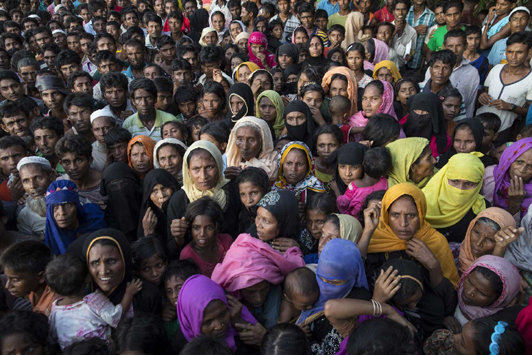DHAKA, April 28, 2018 (BSS) – A 15-member United Nations Security Council (UNSC) delegation reached Cox’s Bazar today to see the plight of the forcibly displaced Myanmar nationals, who have taken shelter in Bangladesh in face of violence in Myanmar’s Rakhine state.
The UNSC team led by its President Gustavo Meza-Cuadra of Peru arrived at Cox’s Bazar Airport at around 4.15 pm by a Kuwait Airlines flight from Iraq, officials said from Cox’s Bazar.
Rear Admiral (Retd) Khurshid Alam, a secretary at Foreign Ministry, received the delegation members.
The 15-member UNSC delegation includes the representatives of five permanent members of the Security Council like – the USA, Russia, France, the UK and China.
The other members include permanent representatives from Bolivia, Equatorial Guinea, Ethiopia, Kazakhstan, Kuwait, Netherlands, Peru, Poland and Sweden and deputy permanent representative from Ivory Coast.
During the visit, the team members will exchange views with the government officers engaged in the repatriation process, local and foreign organizations working there for providing humanitarian assistance and other services to the Rohingya community in different camps.
After returning Dhaka, the UNSC team will pay a courtesy call on Prime Minister Sheikh Hasina Hasina on Monday and then leave for Myanmar for a two-day visit to discuss on the Rohingya issues with Myanmar authorities.
Our Cox’s Bazar correspondent said that the delegation would visit the Rohingya camps in Kutupalong and interact with the forcibly displaced people to learn about the atrocities they faced in Myanmar’s Rakhine state by the security forces.
Refugee Relief and Repatriation Commissioner Abul Kalam Azad will brief the UNSC team later this afternoon about the overall Rohingya situation, including major challenges they are facing for handling the huge number of Rohingya people.
Nearly 700,000 Rohingyas fled Myanmar military’s violent crackdown on them since August 25 last year, while more than 300,000 others, who crossed over from Myanmar in the previous years, were already staying in Bangladesh, posing a major humanitarian threat to the country.



